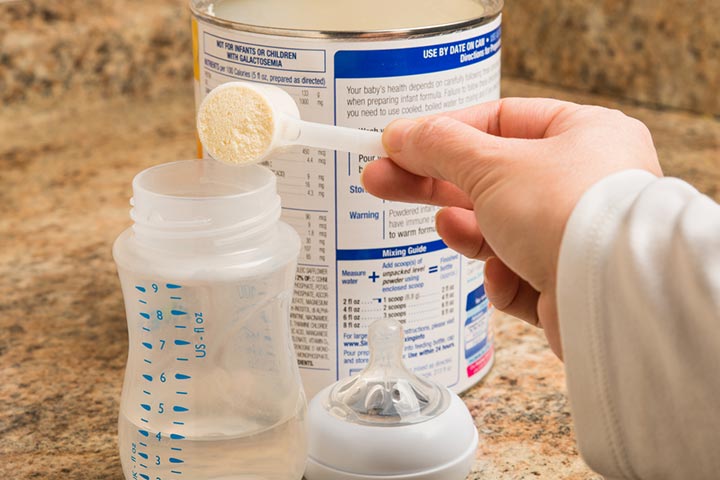Many parents worry when their baby does not gain weight as expected; however, it is important to understand that the growth rate among babies varies, as does their weight gain pattern.
Healthy newborns lose around 5–10% of their weight within a week of birth (1). However, they regain this weight within two weeks. By 12 months, the birth weight of most babies gets tripled (2). These weight changes indicate healthy growth and optimal calorie consumption in babies.
If your baby does not gain enough or is underweight, there is often no reason to worry. Several benign causes lead to slow weight gain in babies. Consult a pediatrician to understand the exact cause and take steps to prevent any long-term problems.
Read this post to understand the possible reasons a baby does not gain weight, notable signs and symptoms, and the treatment options available.
Reasons For A Baby Not Gaining Weight
A baby may be gaining weight slowly or not gaining weight at all. In both cases, several factors can be responsible (3). The following are some of the notable potential reasons.
1. Insufficient calorie intake
Most healthy, full-term newborns take one to two ounces of milk per feeding every two to three hours (4). As they grow, the amount of milk per feed increases, and the feeding frequency reduces, yet babies get the required number of calories. However, some babies may not get the calories they need due to any of the following reasons.
- Poor latching and positioning of the baby make it difficult for the baby to consume adequate breast milk. Chronic latchingiXInability of the babies to attach or suck milk during breastfeeding issues can also cause pain and discomfort to the mother, leading to infrequent feedings. These breastfeeding issues can be corrected with the guidance of a lactation consultant.
- Chronic low milk production is one of the prominent reasons for a baby not gaining weight properly. Low milk supply can happen due to several medical and non-medical reasons, such as infrequent breastfeeding or breast surgery. Consulting a lactation consultant is crucial for prompt resolution of the issues.
- Short nursing sessions are another common reason for a baby not gaining weight. Nursing sessions become shorter if the mother and the baby face feeding difficulties, such as low milk supply or the baby falls asleep on the breast or while bottle-feeding. Waking a baby up for feeding and keeping them engaged by stroking their cheeks or hands or feet can help them nurse longer.
- Starting solids can cause slow weight gain as the baby’s body adjusts to the new feeding pattern. Remember, even when babies are eating solids, many of their calories come from breast milk or formula. If the frequency of breast milk or formula feeding reduces while feeding solids, it could lead to slow weight gain.
- Medical conditions: Certain medical conditions, such as Down’s syndromeiXChromosomal disorder (trisomy 21) characterized by reduced muscle tone, delayed physical and intellectual development and premature birth, cause slow weight gain. These conditions usually cause feeding difficulties due to underdeveloped muscles required to suck and swallow (5).
2. Low absorption of calories
Some babies may be consuming sufficient calories, but the absorption of those calories may not be happening due to (6):
- GERD: Gastroesophageal reflux disorder is a digestive disorder where the baby unusually and frequently spits up after feeds. The underdeveloped or weak lower esophageal sphincter is the prominent cause of reflux in infants. GERD could impede feeding sessions or interfere with digestion, hindering the absorption of calories.
According to a comprehensive study done by multiple institutions, more than 25% of babies aged zero to 18 months experience symptoms of GERD.
- Food allergies and sensitivities: Some babies are allergic or sensitive to certain foods. For instance, in celiac disease, an autoimmune disorderiXA group of medical conditions where the body’s immune system erroneously attacks healthy cells, a baby cannot digest wheat. If they consume wheat or wheat-based cereal, they get diarrhea or vomiting, contributing to poor calorie absorption, which could ultimately prevent the baby from gaining weight.
Besides these, medical conditions such as galactosemia and cystic fibrosis can impair the body’s ability to produce energy from food or hinder energy absorption, causing slow or no weight gain.
3. Over-utilization of calories
Babies have increased energy needs due to rapid growth and development. However, in certain conditions, these needs increase further. For instance, babies with breathing difficulties or infections need more calories than usual to heal, recover, and gain weight.
If your baby isn’t gaining weight, irrespective of the cause, consult a pediatrician promptly.
4. Low birth weight baby
Though not a definite reason for not gaining weight, babies weighing significantly less at birth might face difficulties with weight gain. A baby is said to have a low birth weight if they are born weighing less than 2,500 grams (5 pounds, 8 ounces). Such babies are often born prematurely, and their tiny bodies may not be able to effectively feed, resulting in less weight gain (7).
Diagnosis Of Weight Gain Issues In Babies
A pediatrician will do a physical examination, take your infant’s medical history, and check their height and weight to diagnose weight gain issues. They will plot your baby’s height and weight on the pediatric growth chart to determine the growth pattern. A pediatric growth chart is an assessment tool that compares a baby’s weight-for-age and weight-for-length against the standard ranges for babies of the same gender and age (8).
The US Centers for Disease Control and Prevention (CDC) recommends using the WHO’s growth standards chart to monitor breastfeeding infants’ growth (9). For formula-fed babies, using the CDC’s growth chart is advisable.
Your doctor will record your baby’s weight and height on every visit and monitor your baby’s overall growth. If a baby shows persistent low weight gain over a period, they may assess the baby further to determine the cause.
In cases of no weight gain for an extended period, the doctor may advise some tests, such as blood count, thyroid hormone test, and urinalysisiXA series of urine tests employed to diagnose potential health disorders and infections.
How To Help Babies Gain Weight?
You can help babies gain weight in several ways. Discuss a strategy with your pediatrician for the best outcome for your baby. Here are some interventions you can consider.
- Focus on treating any underlying medical condition, such as a digestive disorder or other illness. Prompt treatment of the condition in most cases can help a baby attain the correct weight. If your doctor sees the need, they may suggest nutritional supplements to fill the dietary gaps.
- Monitor your baby’s latch. Inverted nipples, tongue-tie, and cleft palateiXA congenital disability where the baby’s palate (roof of the mouth) is abnormally developed are a few causes of latching failure. If the baby cannot latch properly or you face any issue with the positioning of the baby, seek support from a lactation consultant.
A mother of five, Jen, recalls how her two-week baby’s tongue tie hindered her weight gain. She says, “I’ve only been a mother for two short weeks. Every day, it feels like I am learning something new about my daughter and myself. One week ago, we found out that Olivia was tongue-tied. It has made it very hard for her to nurse, and she has not been gaining weight like a new baby should… At our two-week well visit, we discovered that Olivia had not gained much weight and that we needed to have a procedure done to release her tongue as soon as possible. Thankfully, the procedure went well!… Olivia has already started eating better, which is an answer to prayer! (i)”
- Avoid using pacifiers until feeding is established. It can take three to four weeks for a baby to become adept at breastfeeding or bottle-feeding (10). Offering a pacifier before feeding is established could lead to nipple confusion, leading to inadequate feeding. Even when feeding is established, do not use a pacifier as a temporary aid to calm a hungry and cranky baby. Offer a breast or bottle when the baby is hungry and a pacifier when the baby is cranky but not hungry as part of a comprehensive care plan for the baby’s well-being.
- Keep your baby awake during feeds. An awake and active baby usually nurses for about 20 minutes or more on one or both breasts during each feeding (11). If you feel your baby might fall asleep, tickle their palms and feet, change your breastfeeding position, burp them, or switch the breast to keep them awake.
- Increase the frequency of feeding to ensure the baby is consuming sufficient breast milk or formula and achieving optimum nutrition. Frequent breastfeeding is also helpful in boosting milk production. Stay hydrated, eat a well-balanced diet, and rest well to ensure healthy milk production. You may consume some baby-safe lactation-boosting foods, such as fennel and oatmeal, after consulting your lactation consultant.
- Monitor the appetite and the baby’s calorie intake by recording their milk consumption using markers on the bottle. You can also closely observe the manner your baby sucks and swallows while feeding. Babies tend to suck slowly and persistently when the milk flow is optimum. Alternatively, you can start monitoring their diaper. A well-fed baby wets six to eight diapers in a day (12).
- Increase the baby’s calorie intake. To do so, encourage your baby to empty one breast before switching to another. It ensures the baby is getting the hindmilk, containing a higher percentage of fat than foremilk. For formula-fed babies, you can consult a pediatrician to know if a formula change is required.
- Check about supplementing the feed or using a mixed feed approach. In such cases, the doctor may suggest you feed both breast milk and formula to your baby. If you are formula feeding, you can feed expressed breast milk to your baby through a bottle or any other alternative feeding technique, such as a dropper or with a cup and spoon.
Besides these, weigh your baby regularly at home until they start gaining weight. Maintain a weight record and share the data with your doctor to work closely for your baby’s healthy weight gain.
Weight loss in babies is usually not a cause for concern, as they progressively gain weight as they grow. Even though they don’t appear to be overweight, a check may reveal that they are growing properly for their age. If you are worried about your baby not gaining weight or weight gain is happening at an alarmingly slow rate, you should consult your child’s doctor to rule out any underlying causes. Depending on the cause, your pediatrician may recommend treatment, while you can follow some simple guidelines to help your baby gain a healthy weight.
Key Pointers
- A baby might not be gaining weight due to poor latching, low milk production, food allergies, or rapid growth and development.
- If the weight does not increase for a long time, the pediatrician may diagnose to check your baby’s growth pattern.
- Treating any underlying conditions, avoiding pacifiers until they feed, and increasing the feeding frequency could help the baby gain weight.
Fuel your 9-month-old’s development using a wealth of guidance on nutrition, feeding, and activities. This invaluable video equips you to nurture your baby’s health and strength effectively.















